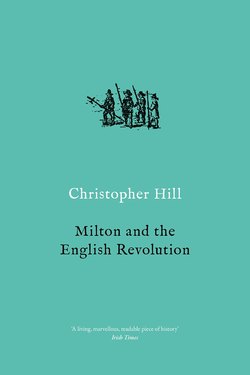Читать книгу Milton and the English Revolution - Christopher Hill - Страница 8
На сайте Литреса книга снята с продажи.
ОглавлениеPreface
In this book I have modernized seventeenth-century spelling and punctuation, and have used the new style in dating. I have quoted Milton’s prose writings mostly from the Yale edition of his Complete Prose Works. Since Volumes VII and VIII are not yet to hand, I have cited items in these volumes from the Columbia edition. I was, however, able to see Professor Woolrych’s Introduction to Vol. VII. In order to help readers to identify any work cited, I have listed Milton’s major writings on pp. xvii-xviii, with the volume number and pages which each pamphlet occupies in the edition which I have used. Latin works are listed separately, so that readers can ascertain when they are reading a translation rather than Milton’s own words. I have had to mention many of Milton’s contemporaries in my text: some of these are briefly described in the Index.
In writing this book I have incurred many debts. The first is to my parents, who brought me up to revere Milton, for reasons which I would not now altogether share. Mrs. Isabel Rivers, Professor Michael Fixler, Thomas Hodgkin and Edward Thompson helped me to clarify my ideas at an early stage. Peter Clark, Andrew Foster, Margot Heinemann, Leo Miller, Professor K. W. Stavely and Mr. P. A. Trout all very kindly allowed me to read unpublished work. Professors John Carey and Christopher Ricks, Margot Heinemann and Dr. Brian Manning all read the lengthy typescript, and laboured enormously to help me to say what I meant: so did Mrs. Elizabeth Renwick. I am also grateful for various kindnesses to Dr. David Aers, Ms. Barbara Breasted, Professors N. T. Burns, Harriett Hawkins, Stella Revard, Alice-Lyle Scoufos, Mrs. Elisabeth Sifton, Mr. Keith Thomas, Ms. Jill Tweedie, Dr. Nicholas Tyacke, and to the many groups with whom I had the pleasure of discussing Milton. The dedication acknowledges a debt which goes back at least to Don Wolfe’s pioneering Milton in the Puritan Revolution of 1941. Paul Hamilton and Andrew Hill undertook the laborious task of reading the proofs, and Mrs. Marion Cross gave me skilful assistance with the typing. Balliol College generously allowed me a sabbatical term in 1973, during which some of the necessary reading was done, and another in 1976, which I was invited to spend at the Folger Shakespeare Library in Washington discussing Milton with a most stimulating group of scholars. By that date the typescript was in the publishers’ hands, so I was not able to incorporate as much from these exciting exchanges as I would have wished; but I owe a great debt of gratitude to the Folger Library for the invitation, to its unfailingly kind and helpful staff, and to all who attended the seminar, especially perhaps Professors Stanley Fish, Gary Hamilton, Fredrica Lehrman, Joseph Martin, Jean-Kathleen Moss, Florence Sandler, Edward Weismiller and Dr. Brenda Szittya. My greatest debt is to my family for their forbearance, and especially to Bridget for her sympathetic understanding, unfailing encouragement and judicious goading.
